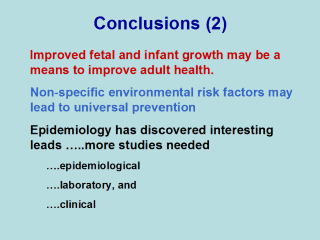 |
A prevention orientation in schizophrenia
research requires further work on risk factors for schizophrenia.
Nevertheless, a couple of points can be made.
While there is a lack of specificity of risk factors for schizophrenia, if a
risk factor is identified, then lack of specificity may lead to prevention
of a number of different illnesses. As an example, preventing schizophrenia
would also prevent schizotypy.
While the evidence for some contemporary putative risk factors – nutritional
deficiencies (such as low maternal vitamin D), pre-natal infections, and
obstetric complications - is currently scant or unclear, they are attractive
candidate for universal intervention. Better maternal care is safe,
relatively cheap, and could improve a range of adventageous health outcomes
in the offspring, making this a cost-effective public health intervention.
Epidemiology has discovered interesting clues about the etiology of
schizophrenia. These leads raise important questions which urgently require
further epidemiological, laboratory-based and clinical studies.
 |
Go to Comment Form |
|